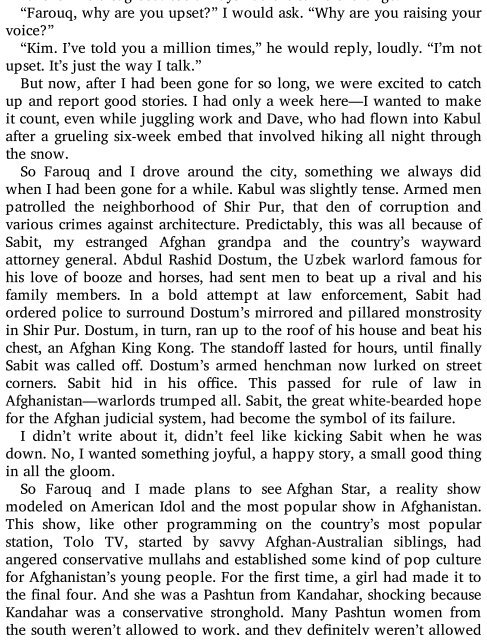the_taliban_shuffle_-_kim_barker
the_taliban_shuffle_-_kim_barker
the_taliban_shuffle_-_kim_barker
Create successful ePaper yourself
Turn your PDF publications into a flip-book with our unique Google optimized e-Paper software.
“Farouq, why are you upset?” I would ask. “Why are you raising your<br />
voice?”<br />
“Kim. I’ve told you a million times,” he would reply, loudly. “I’m not<br />
upset. It’s just <strong>the</strong> way I talk.”<br />
But now, after I had been gone for so long, we were excited to catch<br />
up and report good stories. I had only a week here—I wanted to make<br />
it count, even while juggling work and Dave, who had own into Kabul<br />
after a grueling six-week embed that involved hiking all night through<br />
<strong>the</strong> snow.<br />
So Farouq and I drove around <strong>the</strong> city, something we always did<br />
when I had been gone for a while. Kabul was slightly tense. Armed men<br />
patrolled <strong>the</strong> neighborhood of Shir Pur, that den of corruption and<br />
various crimes against architecture. Predictably, this was all because of<br />
Sabit, my estranged Afghan grandpa and <strong>the</strong> country’s wayward<br />
attorney general. Abdul Rashid Dostum, <strong>the</strong> Uzbek warlord famous for<br />
his love of booze and horses, had sent men to beat up a rival and his<br />
family members. In a bold attempt at law enforcement, Sabit had<br />
ordered police to surround Dostum’s mirrored and pillared monstrosity<br />
in Shir Pur. Dostum, in turn, ran up to <strong>the</strong> roof of his house and beat his<br />
chest, an Afghan King Kong. The stando lasted for hours, until nally<br />
Sabit was called o. Dostum’s armed henchman now lurked on street<br />
corners. Sabit hid in his oce. This passed for rule of law in<br />
Afghanistan—warlords trumped all. Sabit, <strong>the</strong> great white-bearded hope<br />
for <strong>the</strong> Afghan judicial system, had become <strong>the</strong> symbol of its failure.<br />
I didn’t write about it, didn’t feel like kicking Sabit when he was<br />
down. No, I wanted something joyful, a happy story, a small good thing<br />
in all <strong>the</strong> gloom.<br />
So Farouq and I made plans to see Afghan Star, a reality show<br />
modeled on American Idol and <strong>the</strong> most popular show in Afghanistan.<br />
This show, like o<strong>the</strong>r programming on <strong>the</strong> country’s most popular<br />
station, Tolo TV, started by savvy Afghan-Australian siblings, had<br />
angered conservative mullahs and established some kind of pop culture<br />
for Afghanistan’s young people. For <strong>the</strong> rst time, a girl had made it to<br />
<strong>the</strong> nal four. And she was a Pashtun from Kandahar, shocking because<br />
Kandahar was a conservative stronghold. Many Pashtun women from<br />
<strong>the</strong> south weren’t allowed to work, and <strong>the</strong>y denitely weren’t allowed



